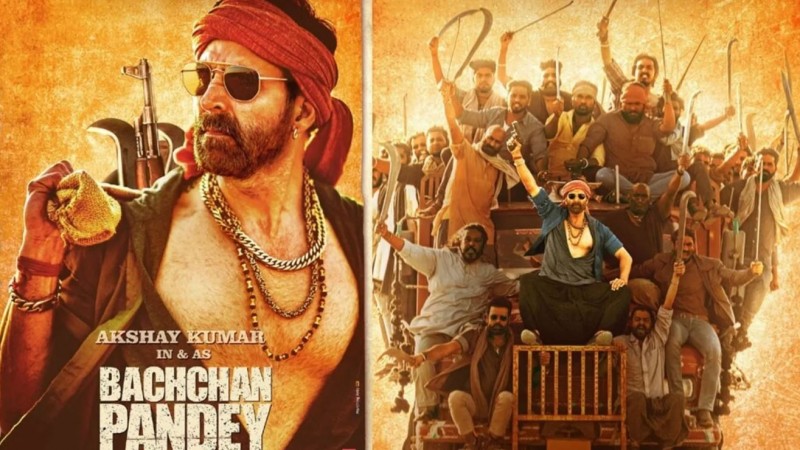
Akshay Kumar is without a doubt one of the most adaptable and successful actors in Indian cinema. Kumar, who is well-known for his ability to move between different genres with ease, has played many iconic characters on film over the years. In "Bachchhan Pandey," his 2023 film, Akshay Kumar dons a new avatar once more, this time portraying a character who is deeply ingrained in the world of gangsters. However, it's not just Kumar's performance that draws the audience in; there are also a lot of inconspicuous allusions and nods throughout. The audience is treated to a cinematic easter egg in a scene where Kumar's character takes centre stage: a movie poster for Ram Gopal Varma's "Company," which stars Vivek Oberoi and Ajay Devgn. Though it may seem insignificant, this detail reflects a deeper meaning, illustrating the rich tradition of allusion and homage in Indian cinema as well as the film's thematic elements.
Before discussing the meaning behind the "Company" movie poster in "Bachchhan Pandey," it's important to know the background information of the movie. Under the direction of Farhad Samji, "Bachchhan Pandey" centres on the life of Akshay Kumar's character, Lallan Singh, a small-town goon. The outrageous character Lallan wants to be an actor and is a huge fan of Amitabh Bachchan. The movie shows the audience the highs and lows of Lallan's journey and how, in the end, he becomes the big-screen character he had always wanted to play.
One of the main themes of "Bachchhan Pandey" is the world of crime and gangsters, which is a familiar subject in Indian cinema. Bollywood has a history of depicting gangsters and the criminal underworld; films like "Don," "Sarkar," and "Satya" all explore this sinister and compelling side of society. A "Company" poster is woven into the story of "Bachchhan Pandey," a subtle nod to this cinematic institution from the directors.
With Ajay Devgn and Vivek Oberoi in key parts, "Company" is a 2002 crime drama helmed by Ram Gopal Varma. The film is renowned for its realistic and gritty depiction of Mumbai's underworld, which draws influence from actual people and events. It explores the power dynamics, treacherous transactions, and betrayals that occur within the criminal underworld. A reference to the common theme of the world of gangsters can be found in "Bachchhan Pandey" when "Company" appears in the background.
The gangster character plays an important role in both movies. "Bachchhan Pandey" employs this theme more as a setting for character development, but "Company" dives deeply into the lives of gangsters and their illicit activities. The posters highlight how the gangster genre is a common theme in both films.
In addition, the use of the "Company" poster honours the larger tradition of Indian gangster films in film. Bollywood has created many cult classics exploring the intricacies of the underworld over the years. "Company" was a notable film in this subgenre, and the inclusion of its poster in "Bachchhan Pandey" is a nod to its historical significance in Indian cinema.
The practise of honouring or quoting other films is not exclusive to "Bachchhan Pandey." There is a long-standing custom in Indian cinema to include allusions and references to both current and previous motion pictures. This is a common tactic used by filmmakers to connect with viewers, arouse nostalgia, or honour the classics that have influenced them.
The idea of homage in films is not exclusive to Bollywood. Globally, filmmakers frequently make allusions to well-known moments, figures, or motion pictures in order to establish a feeling of familiarity and establish a deeper connection with the audience. For example, Quentin Tarantino is well known for using a lot of cinematic allusions in his films, which help to weave a complex and engrossing web of related tales.
Bollywood allows tribute to take many different forms, ranging from overt recreations of famous scenes to subtle visual cues. Not only are these allusions cross-cultural and historical, but they are also specific to a single genre. Through the incorporation of a poster from "Company" into "Bachchhan Pandey," the filmmakers honour a classic in the gangster genre while also building a link between two films that have a common theme.
Bollywood masala movie "Bachchhan Pandey" is not just another one. This film pays tribute to classic films that have had a significant influence on the industry and acknowledges the rich history of Indian cinema. The gangster genre, which has been a recurring and significant theme in Bollywood, is subtly and meaningfully referenced by the inclusion of the "Company" poster.
By means of this cinematic reference, "Bachchhan Pandey" highlights the common thread that unites two distinct stories and bridges the gap between them. It pays homage to the legacy of Indian cinema that has shaped Bollywood while demonstrating the lasting impact of films such as "Company." The film's homage to a single film ultimately serves as a monument to the craft of storytelling across time, not only to the life of Lallan Singh but also to India's rich cinematic legacy.
Varun Dhawan's Unparalleled Dedication to 'Sui Dhaaga' Role
Remembering Kishore Kumar: The Legendary Singer from Khandwa
Remembering the Man Behind the Music: Kishore Kumar's 36th Death Anniversary